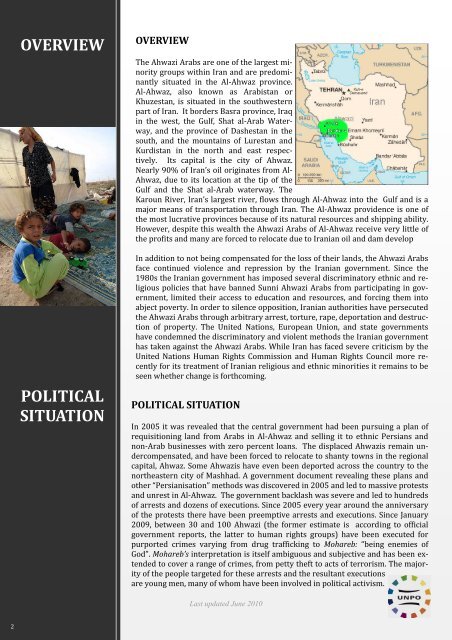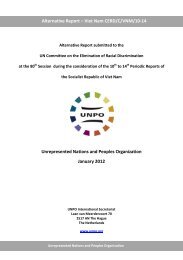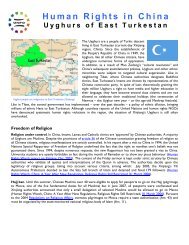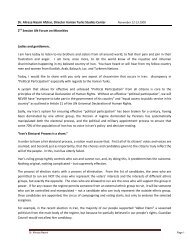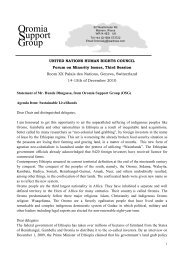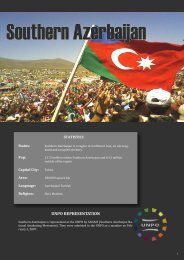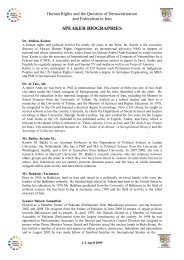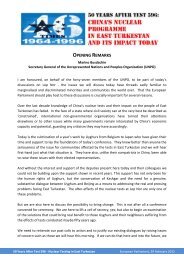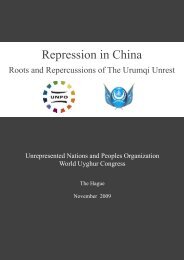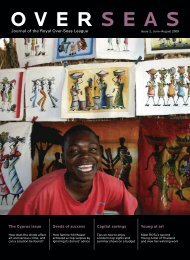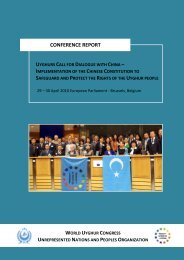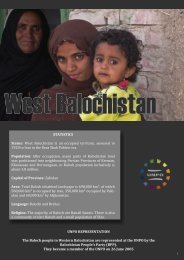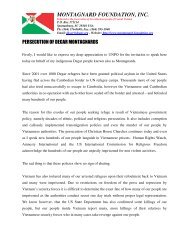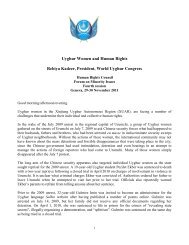UNPO REPRESENTATION
UNPO REPRESENTATION
UNPO REPRESENTATION
You also want an ePaper? Increase the reach of your titles
YUMPU automatically turns print PDFs into web optimized ePapers that Google loves.
OVERVIEWPOLITICALSITUATIONOVERVIEWThe Ahwazi Arabs are one of the largest minoritygroups within Iran and are predominantlysituated in the Al‐Ahwaz province.Al‐Ahwaz, also known as Arabistan orKhuzestan, is situated in the southwesternpart of Iran. It borders Basra province, Iraqin the west, the Gulf, Shat al‐Arab Waterway,and the province of Dashestan in thesouth, and the mountains of Lurestan andKurdistan in the north and east respectively.Its capital is the city of Ahwaz.Nearly 90% of Iran’s oil originates from Al‐Ahwaz, due to its location at the tip of theGulf and the Shat al‐Arab waterway. TheKaroun River, Iran’s largest river, flows through Al‐Ahwaz into the Gulf and is amajor means of transportation through Iran. The Al‐Ahwaz providence is one ofthe most lucrative provinces because of its natural resources and shipping ability.However, despite this wealth the Ahwazi Arabs of Al‐Ahwaz receive very little ofthe profits and many are forced to relocate due to Iranian oil and dam developIn addition to not being compensated for the loss of their lands, the Ahwazi Arabsface continued violence and repression by the Iranian government. Since the1980s the Iranian government has imposed several discriminatory ethnic and religiouspolicies that have banned Sunni Ahwazi Arabs from participating in government,limited their access to education and resources, and forcing them intoabject poverty. In order to silence opposition, Iranian authorities have persecutedthe Ahwazi Arabs through arbitrary arrest, torture, rape, deportation and destructionof property. The United Nations, European Union, and state governmentshave condemned the discriminatory and violent methods the Iranian governmenthas taken against the Ahwazi Arabs. While Iran has faced severe criticism by theUnited Nations Human Rights Commission and Human Rights Council more recentlyfor its treatment of Iranian religious and ethnic minorities it remains to beseen whether change is forthcoming.POLITICAL SITUATIONIn 2005 it was revealed that the central government had been pursuing a plan ofrequisitioning land from Arabs in Al‐Ahwaz and selling it to ethnic Persians andnon‐Arab businesses with zero percent loans. The displaced Ahwazis remain undercompensated,and have been forced to relocate to shanty towns in the regionalcapital, Ahwaz. Some Ahwazis have even been deported across the country to thenortheastern city of Mashhad. A government document revealing these plans andother “Persianisation” methods was discovered in 2005 and led to massive protestsand unrest in Al‐Ahwaz. The government backlash was severe and led to hundredsof arrests and dozens of executions. Since 2005 every year around the anniversaryof the protests there have been preemptive arrests and executions. Since January2009, between 30 and 100 Ahwazi (the former estimate is according to officialgovernment reports, the latter to human rights groups) have been executed forpurported crimes varying from drug trafficking to Mohareb: “being enemies ofGod”. Mohareb’s interpretation is itself ambiguous and subjective and has been extendedto cover a range of crimes, from petty theft to acts of terrorism. The majorityof the people targeted for these arrests and the resultant executionsare young men, many of whom have been involved in political activism.Last updated June 20102


